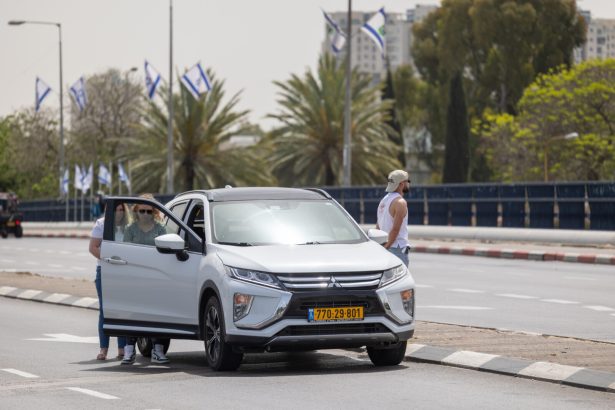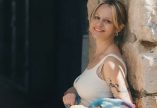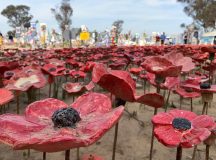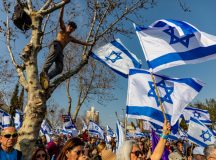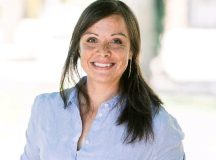There is a rhythm to this Land.
Not a melody exactly –
But a pulse.
A thrum beneath the stones and sun-scorched hills, beneath the eucalyptus smoke and rosemary, beneath our ribs.
Some days, it sounds like prayer.
Other days, like warning.
During these days –
between Yom Hazikaron and Yom Haatzmaut,
between the silence of memory and wail of the sirens –
I tried to listen closely.
To notice what moves beneath the surface.
What aches.
What insists on blooming anyway.
These aren’t ordinary days, but they aren’t extraordinary either.
They are the days we live here:
where grief is muscle memory,
and hope is a choice we keep making.
The sirens that tell us when to stand still have faded,
but the others –
the ones that send us running –
have not.
And still, the coffee brews.
The children play.
Someone drops a few coins in a beggar’s cup.
And sometimes, if you’re paying attention,
you can hear an entire universe.
Sunday April 27
The taxi driver who lives next to the mosque in the village just across the road from me has a whole docket of regular passengers – friends, he calls them. (Turns out, I’m not that special.)
He called me two years ago, just after the Memorial Day siren had faded into the hills, and said he had a story for me.
I’m thinking of this story now because we are in the in between time between Yom HaShoah and Yom HaZikaron – a time that, for me, feels almost like a secular version of the Days of Awe. In the days between Rosh Hashanah and Yom Kippur, we move through a space that is tender and raw, where everything carries weight, and even silence has shape.
This is different – but still sacred.
Between the day we remember the heroes of the Warsaw Ghetto and all who were murdered in Hitler’s maw, and the day we mourn our fallen soldiers and victims of terror, we walk a narrow bridge suspended over a vast sorrow.
Already, there are those who fast – who treat this time with its own quiet holiness.
‘One of my favorite passengers,’ the taxi driver says. ‘An old man who lives around the corner from you – on your side of the road.’
The old man is almost blind now, the driver tells me – white hair blooming like cotton over his ears.
He wears a yarmulke.
His daughter dresses him in the morning, buttons his shirt, buckles his belt, tucks him in at night.
He can’t remember how the pieces fit together anymore, but if you squint, you can still see it:
The man he once was.
Handsome. Strong.
‘He was in the army during the Nakba,’ the driver says. ‘But that was a long time ago. He’s very old now.’
‘Did you ever talk about the war?,’ I ask.
‘No,’ the driver says. His voice tightens. ‘Even before he forgot so much, we didn’t talk about it. I think I would have gotten angry. My family lost everything in the Nakba. His family calls him a hero. I don’t want to think about it.
But now… he’s very old. And I like him. I like him now.
He is my old friend.’
Every Wednesday, the driver picks up his old friend to take him to the clinic.
‘He’s fading,’ he tells me. ‘Every time, a little more.
I walk him in, wait for him in the waiting room.
Usually his daughter comes too – she doesn’t drive – but sometimes it’s just us.
He forgets where the toilet is.
He can barely see.
But he sees me.
And he remembers me.’
I can hear the driver smiling through the phone.
‘So did you take him today?’ I ask.
‘Yes,’ he says. ‘Come on! That’s why I called you.
Today, it was just the two of us. His daughter couldn’t come.
We went to the clinic, and afterward we got into the car – and I looked at the clock and realised we’d still be on the road at 11, when the Memorial Day siren would sound.
And I felt this pain – here –’ (I can hear him tap his chest through the line) ‘– and I didn’t know what to do.
I usually try not to be driving then. I don’t want to have to pull over. I don’t want to stand.
But I don’t want to refuse to stand, either.
I’m sorry, but I must speak the truth:
I don’t hate Israel.
But I don’t mourn on Memorial Day.
Holocaust Day is different – I stand for that.
But Memorial Day…’
He lets the words trail away.
‘It’s not my Memorial Day.
Still, it stirs up old ghosts.
Two of my cousins died in the second intifada.
My grandfather lost an eye in the Nakba.
It’s not my Memorial Day – but I remember.’
‘So what did you do?’ I ask.
‘I didn’t decide until the last second,’ he says.
‘The siren went off. My hands were shaking on the wheel.
I wanted to keep driving.
But I looked back –
and I saw him.
He heard it too.
And something clear, something fierce lit up in his eyes.
He tapped the window.
I tried not to notice.
But then he started banging – soft at first, then harder.
And I thought about my grandfather.
And I hoped he would forgive me.
I pulled over.
I got out.
Opened the door.
Helped my old friend out of the backseat.
He could barely stand – he shook like a branch in a hard wind –
so I put my arm across his shoulders,
steadying him.
And we stood there –
side by side –
with maybe ten, twelve other people,
all of us still as trees, rooted to the side of the road.
My old friend was trembling.
Tears were falling down his face.
I felt sad for him.
Sad for everything.
But I stood.
We stood.’
He falls quiet for a moment.
‘My grandfather planted fruit trees here before the Nakba,’ he says softly.
‘I don’t know if they’re still standing.
Or where they were.
But he also planted other seeds.
I am one of them.
Today, I stood like a tree, for my old friend to lean on.
Maybe we are all trees, really.
Living, breathing, rooted by the side of the road.
Me, my old friend, the others.
Still here.
Still standing.
Our seeds and roots everywhere.
Here, forever.’
Monday April 28
O God, my heart.
Maybe it’s the way he asks for a sip of coffee now, and the way he likes it, or how his dad gave him that buzz cut and I can see the shape of his face, sharper than before. Maybe it’s how he’s almost as tall as me, with lean legs and strong arms, how he’s lost that softness, that powdered donut sweetness, and now, when he gets hurt, he swallows his tears because ‘only babies cry.’
I don’t know what it is, God, but my heart trembles.
In another place, perhaps I would just notice these changes and smile with a bit of wistfulness, watching him grow, knowing that for every inch he gains, a new thread of silver weaves into my hair. The days would fade into new dawns, one after the other, and I’d marvel at the passing of time, at his becoming, at my own.
But here in our Homeland, I look at him differently.
They say that all Jewish mothers in Israel, at some point, look at their children knowing we’ll have to give them away – not like in any normal country, because we are not a normal country. Here, our sons and daughters will lace up combat boots, pick up rifles, and hand over their lives, one by one, for their unit, for a pair of dog tags.
And maybe it’s because we’re getting closer to that age, that age when he’ll have to serve, or face a lifetime of being marked as different, in a society that drinks in stories of heroes like mother’s milk. Or maybe it’s because he told me he’s afraid – afraid he’ll have to kill someone almost as much as he’s afraid of being killed himself.
How can we hide our children from the truth, O God, when every hour the news cuts through their music with another bulletin? How can we shield them when everyone here knows someone who’s been killed or wounded in a war or an attack? How can we protect them when just living here, just being here, is writing history with our every breath?
And I look at him, God, and I see him still a kid, truly a kid – not a baby, but still not grown. My kid who pretends to believe in the tooth fairy because he loves the ancient coins I leave him, but still sleeps with a stuffed whale, who won’t hold my hand in public unless we’re alone, who comes home from school and tells me what his friends say about those who want to harm us. And when I sit him down to explain it isn’t true, I can see the struggle in his eyes because fear is big and hungry and has sharp teeth.
O God, my heart ACHES.
I am afraid that we’re holding on to the last thread of sanity, and that this whole thing is about to unravel into something terrifying.
I am afraid for his soft skin, for his sweet little face. I am afraid to look those other mothers in the eye, the ones who weep over open graves, knowing it could be any of us.
God protect us.
Please, God, let this be the last generation where we have to give our sons and daughters like this. Let it be different – and soon.
For I am terrified that one day, he’ll look at his own little boy or girl and feel this same cold dread that I’m feeling now. And that, God, is almost too unbearable for words.
Please. Please. Let the strife end.
Yet, O God, even in the midst of my fear, my heart yearns and I hold onto hope.
I hope for a day when our children will grow up in a land where peace is not just a prayer but a promise, where the weight of war is lifted from their shoulders, and they can walk freely, hand in hand, into a future bright with possibility. I hope for a time when we will look at them with pride, not for the battles they’ve fought, but for the lives they’ve lived in harmony and love. Please, God, let that day come soon. Amen.
Evening of Tuesday April 29, after the Memorial Siren
We stand and remember.
It was after the first siren on October 7 – before we understood the full scope of the catastrophe we had been plunged into – when my son saw it on Instagram:
Dvir’s sister was missing.
Shiraz.
The cool big sister.
The fun babysitter.
The smart, lively girl everyone loved.
She had last been seen near Netivot – her final contact just after 7 am, when the massacres began.
We held our breath.
We prayed.
Maybe she was hiding. Maybe her battery had died. Maybe she would still come home.
But by Sunday afternoon, and they had found Shiraz’s body lying alone on scorched, blood-soaked earth – earth that would never again bring forth life from that place.
I had watched Shiraz grow from a laughing teenager into a young woman who carried the world’s brightness in her smile.
She was the kind of soul who made you believe life could be good and sweet.
Her mother was – is – one of the most radiant people I have ever known. A woman whose kindness seemed stitched into her very being.
And my heart broke for them – for all of us who had been graced by Shiraz’s light.
And yes, I was also full of rage.
But beneath the rage, a sorrow so deep it felt like a river inside me, running cold and wild.
My son called me from his dad’s house.
He was on his way to sit with his friend – Shiraz’s younger brother.
‘What do you remember about Shiraz?’ I asked him.
‘She was really nice,’ he said. ‘She was funny, and she used to drive me home sometimes when I played at their house.
I remember once when she dropped me off, she stayed in her car until she saw I got inside.
And one time, when she couldn’t see because a car was blocking her view, she parked, got out, and walked me all the way to the door. Just to be sure.’
Why is it always the ones who stay?
The ones who wait.
The ones who care enough to make sure a child is safely home.
The ones who carry light into the world without even realising it.
It was the best of us they tried to destroy.
But Shiraz’s light is not so easily put out.
It burns in every life she touched.
It burns in the memory of kindnesses she never thought twice about offering.
Shiraz should have lived.
She should have had a lifetime of ordinary days – laughter, tears, triumphs, failures, the sacred rhythm of a life fully lived.
Instead, her life was stolen from her.
And the world is dimmer for it.
But we will remember.
And we will carry her light forward – fiercely, tenderly, stubbornly – refusing to let the darkness win.
May her memory be a blessing.
And may her love be a shield around all who mourn.
Late Morning, Wednesday April 30
I was standing on the street between the King David Hotel and the YMCA – two Jerusalem icons heavy with history.
The King David, once the target of a deadly bombing, still carries the scars of our tangled past.
The YMCA, with its bell tower and arches, holds something different: a quiet hope. Inside, there’s a preschool where Jewish, Muslim, and Christian children learn together – Hebrew and Arabic, holidays and songs, side by side. ‘The good news is they celebrate all the holidays,’ one mother says. ‘The bad news is the kids are NEVER in school because they’re celebrating all the holidays.’
And that’s where I stood when the siren rang.
A few people on the sidewalk stopped in their tracks, heads bowed. The staff from the King David stood in front of the storied hotel. A taxi pulled over; the driver got out. I couldn’t tell if he was Muslim, Christian, or Jewish – and in that moment, it didn’t matter.
But still, some cars kept moving. Another taxi sped by. A few motorcycles wove around the frozen pockets of people. And then, a man stepped into the middle of the street – into the very centre of the street. I don’t know who he was. But he planted himself there like an exclamation point – forcing the cars to stop. Forcing us all to notice.
It was a small act of defiance.
Of insistence.
‘SEE US,’ he said with his whole body. ‘SEE HOW WE ARE HURTING.’
Every single Jewish person I know in our broken Holy city knows someone – or knows the mother or father of someone – who was murdered on 7 October, or who has fallen in battle since, in Gaza or in Lebanon. And those of us with children in the army – or about to go in – are living in a constant, perpetual state of low–grade anguish.
There’s a saying that Yom HaZikaron reminds us of the price we pay to have a country.
And Yom HaShoah reminds us of the price we paid when we didn’t.
And now, as antisemitism rises in ways many of us never imagined we’d witness again in our lifetimes, the imperative of this country – the necessity of a sovereign Jewish home – is no longer just a matter of memory. It is a matter of survival.
And I think about the parents on the other side. The ones who may hate us, or who may fear us, and still see the faces of their own children in the corpses of the children in Gaza, wrapped in burial cloth. It is gut-wrenching. It is unbearable. It should be.
We are living on a live wire –
between the horror and devastation that was unleashed upon us on 7 October,
and the destruction now unfolding in our name.
Between anguish and rage over what Hamas did –
and still does –
and despair over how our own government has responded.
We stand suspended between two excruciating truths: We cannot let Hamas win. And we must find our moral compass while not letting them win.
Yes. It was Hamas that invaded our homes and slaughtered our families.
It is Hamas that holds our people hostage –
children, elders, women, men –
buried in tunnels, veiled in silence.
They perpetuate destruction.
Not only against us –
but against their own people.
In Gaza, they crush dissent,
persecute opposition,
and readily sacrifice innocent lives to prolong their power.
They do not want peace.
They do not value life.
But we need to remember that we must always value life – even if we need to make painful concessions.
That is our strength.
That is our agony.
And that is our sacred obligation.
We grieve our dead.
We cry out for the hostages.
And we are forced to confront the unbearable truth:
that our own government has not made their return its highest most holy priority.
It should have been. It still must be.
And we must not grow numb to the death of Palestinian children, either –
innocent lives caught in the crossfire of a war they did not choose.
This is not a contradiction.
This is what it means to be human –
to be Jewish.
To be Jewish means to wrestle.
To question.
To hold the tension between justice and mercy,
between survival and conscience,
between rage and compassion.
And sometimes it means to push back against extremists in our own community – even those in power. ESPECIALLY those in power.
‘Choose life,’ our tradition teaches.
Even in the fire.
Even when it breaks us open.
We are commanded to see the image of God in every soul –
even in the rubble, even through tears.
We will have to reckon with all of this –
the horror, the heartbreak, the moral cost. The thing is, we haven’t even begun our own Shiva.
But that day will only come
if we do not let the extremists win – extremists we see hard at work in our streets, in the halls of government… perhaps even in our own homes…
We will get up and uncover our mirrors and see:
We have buried too many children.
We dare not bury our values alongside them.
Israel was founded on the dream of life.
Let us fight to defend it –
without losing the very soul we’re fighting for.
Because we are still here,
feet firm on a live wire –
between fire and fury,
between grief and grace.
And somehow, impossibly,
we must find a way to walk it
with our soul intact.
I hope one day the memorial siren won’t be political.
I hope one day we’ll all be able to mourn together – not as distant cousins living in parallel universes in the same hurting city, but as brothers and sisters with shared sorrow, and maybe, one day, shared and nurtured peace.
And I hope those children – those little ones in the preschool with backpacks too big for their bodies and hands sticky with snack time – grow up in a Jerusalem where sirens only signal recess, not remembrance or rockets.
Where standing still isn’t an act of differentiation between Us and Them, but a moment of shared understanding for all we’ve endured, separate and together.
Where the past no longer bleeds into the present.
And where hope finally drowns out the sound of grief.
Afternoon, Wednesday April 30
In Israel, our hearts train or this impossible dance.
The siren wails and our eyes fill with tears.
We stand still – holding the memory of our fallen, tasting the bitterness of grief on our tongues. The radio plays sad songs. A pall of grief descends.
And then, almost before we are ready, the moment shifts: our flag rises, the music swells, the skies explode with light.
We are asked – no, TOLD – to move from mourning to celebration – from heartbreak to hope – without losing the thread of memory that binds them.
It is as though the other soul of our nation lives in that taut second – stretched between two vastly different universes, trembling but unbroken –
and in order to honour that sacred moment, I feel like we need a prayer – a Havdalah of sorts – a way to honour the space between grief and rejoicing.
So I’ve written one –
Havdallah between Holy Grief and Sacred Joy
Blessed are You,
The Beginning of All Being,
who sanctifies the spaces between light and shadow,
who teaches us to separate between holy grief and sacred joy,
between the tear that falls and the song that rises,
between the memory of the fallen and the building of a nation.
Blessed are You,
Breath of Life,
who cradles our shattered hearts and lifts our weary feet to dance,
who plants seeds of hope in fields watered by blood and tears,
who shelters the souls of our beloved ones beneath the wings of Your eternal presence,
and who blesses the living with the strength to choose life, again and again and again.
Blessed are You,
Source of Comfort
who helps us honour the silence with reverence, the singing with gratitude.
May we be worthy stewards of the sacrifice they made, and rise from mourning from strength to strength.
Blessed are You
Light and Moral Compass
who helps us build a future radiant with peace, steadfast in love, and shining with the light of redemption.
Amen.
Evening, Wednesday April 30: Even the Sky is Burning
On Memorial Day in Israel, the sky turned red.
As we stood still to honour the fallen – those taken from us in terror, in war, in heartbreak – the land itself ignited. Flames tore through the hills around Jerusalem. Winds whipped the fire into fury. Roads melted, sirens howled. The cemeteries where we placed flowers this morning now lie under a blanket of smoke.
And just like that, we are reminded: there are forces greater than all of us.
Today, even as our hearts ache with memory, we are asked to battle something else entirely – something without ideology, without borders, without mercy. Fire does not care for whom you vote, to whom you pray, what language you speak, or what flag you carry. Fire burns what it touches.
So we are not alone in fighting it.
Greece is sending planes. So is Italy. And yes – even the Palestinian Authority has offered help.
Because in the end, we share this land. We breathe the same smoke. We tremble under the same sun. And when the forest burns, it is not just Israeli trees or Palestinian trees or Christian, Muslim, or Jewish trees. It is the trees.
It is the air.
It is our home.
On this day of sorrow and remembrance, let this be the takeaway: even when we are divided by history, hurt, and politics, there are still moments – precious, fleeting moments – when we remember we are human first. Fragile. Mortal. And at the mercy of things we cannot always control.
Let those moments matter.
Let them guide us.
Let us not only put out the fires in the forest, but the ones inside us.
Sunday May 4
The fires around Jerusalem are quelled for now.
The air around the burnt pine and olive trees still smells scorched, but the hills are quiet now – charred, not burning. Summer will come and the ground will harden. But then the rains will fall again, and the earth will yield.
We’ve made it past the week of sirens that rise for memory:
Yom HaShoah.
Yom HaZikaron.
We’ve made it past Yom HaAtzmaut.
Grief, and joy – dancing in a minor key.
But the war sirens continue – the kind that makes you grab your children and run.
The kind that reminds you: there are still people who want you dead.
Still missiles overhead.
Still tunnels underground.
Still hostages in Gaza.
Still no real plan.
Still.
So here we are–past the official grief, and still very much inside it.
Past the holidays, and still inside the belly of the war.
It’s Sunday, but nothing is regular.
Not the school drop-offs (if there is school),
not the grocery runs (if the shelves are stocked),
not the coffee (unless it’s gulped on the way to the shelter).
And yet.
And yet.
A child laughs.
A soldier calls home.
I smell orange blossoms.
A neighbour offers you half a cucumber because she has more than she needs.
The little ones at the YMCA preschool are still arguing over who gets the red crayon.
Even in the in-between, life insists.
Even between sirens, something holds.
So today, I light a candle–not for mourning, not for celebration, but for the space between.
The place we live.
The pause between alarms.
The breath between heartbreaks.
The ground we plant in, somehow.
We are still here.
Still afraid.
Still aching.
Still choosing each other.
And maybe that is the most sacred act of all.
Wednesday 7 May
* Editorial note: This series of diary entries was originally published on 6 May 2025. An additional entry, for 7 May, was added on 8 May, at the request of the author. The additional entry responds to remarks made on 6 May by Israeli Finance Minister Bezalel Smotrich.
I’m a Jew and I’m also a Zionist.
And that means I love this land and believe in our people’s right to safety, dignity, and peace.
But if being a Zionist means staying silent while leaders in my government talk about ‘totally destroying Gaza’ and making its people ‘despair enough to leave’– then count me out of that kind of Zionism.
Because I know fear. I’ve lived it.
I know rage. I’ve lived it.
I know what it means to carry a child to bed while the sirens wail.
And I know what it means to live with genetic memory – the kind that’s etched into our bones from exile and expulsion. From Pharaoh. From Babylon. From Rome. From the Inquisition. From the Holocaust. From pogroms in Eastern Europe and across the Arab world. From the long and bitter lineage of being hunted, hated, and burned.
And I know this too:
When we allow our trauma to speak louder than our values, we risk becoming what we were never meant to be.
What Hamas wants – what antisemites around the world want – is for us to lose ourselves.
To let the fire of October 7th blind us to the difference between defence and destruction.
To become the version of ourselves they’ve always feared and hated – the dark, vengeful, heartless Jew.
But that’s not who we are.
We are a people who know the weight of history.
Who remember what it means to be powerless – and choose not to wield power without conscience.
We are commanded to remember the stranger, because we were strangers once too.
We are taught not to harden our hearts, even when it would be easier to do so.
That is our power.
That is our calling.
And that must be our red line.
So no, Minister Smotrich – you do not speak for me.
I will stand against Hamas and anyone who wants to harm us. I’ll fight them myself.
But I will also stand against the kind of rhetoric that desecrates our past and endangers our future.
Because if we become the kind of people who break others in order to feel whole again, then we’ve already lost more than we can afford.
And I won’t let that happen.
Not in my name.
Not in the name of my ancestors.
Not in the name of my children.
And not in the name of Judaism or Zionism, either.

